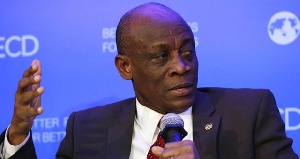 Seth Terkper, Minister of Finance
Seth Terkper, Minister of Finance
Ghana issued a $750 million Eurobond on Thursday at a more favourable yield of 9.25 percent compared to its last sale, officials said, bringing in badly needed cash to balance the government's budget before elections in December.
Finance Minister Seth Terkper told Reuters that Thursday's sale was oversubscribed with orders exceeding $4 billion, reflecting investor confidence in the economy after news that oil is now flowing from a new well.
"A month ago, we hadn't commissioned a new (oil field). .... The fact that the president has commissioned it now and around 25,000 (barrels per day) of oil is coming tells the investors we are keeping our word," Terkper said in an interview.
The West African country aborted an earlier attempt to launch the bond in August because investors were demanding higher than expected yields after Ghana's parliament passed a law allowing central bank financing contrary to IMF restrictions.
Ghana's fifth bond, which will mainly be used to refinance a 2017 debt issue, has a weighted average life of five years with three equal repayments in 2020, 2021 and 2022, the government said.
Bank of America Merrill Lynch, Citigroup and Standard Chartered are the leads. Ghana is rated B3/B-/B.
Economists previously said the government might struggle to sell the bond, given Ghana's economic problems.
Ghana, which also exports cocoa and gold, signed a three-year aid deal last year with the International Monetary Fund (IMF) to restore fiscal balance to an economy dogged by deficits, public debt, high interest rates and inflation.
The IMF said this month that although Ghana has made progress under the programme, there were outstanding issues that must be resolved before the country would receive its next disbursement.
Thursday's yield compared with 10.75 percent for a 15-year $1 billion sale last year and improved on offers a month ago.
Alongside, Ghana also announced a further tender of its 8.5 percent 2017 notes and Terkper said the government was aiming to buy back about $400 million after it bought back around $100 million last month.
President John Dramani Mahama is seeking a second term in what is expected to be a tight race between him and main opposition leader Nana Akufo-Addo who had expressed doubts over investor interest in the bond.
Some analysts believe the sale only reflected a general growing appetite among fund managers for high-yielding emerging market assets, and not because Ghana's conditions had improved.
"The models have been generally trending downwards due to external developments rather than Ghana's own internal developments. It's a lucky window and its good they (Ghana) went in," Joe Abbey, chief economist of the Accra-based Centre for Policy Analysis, told Reuters.